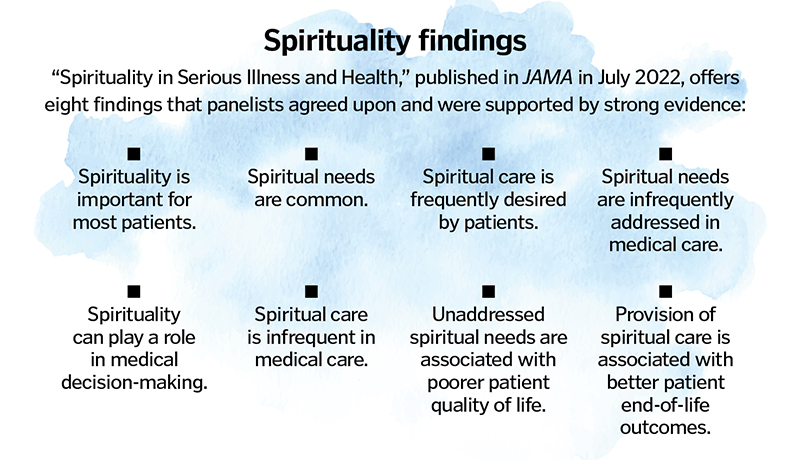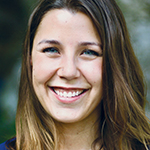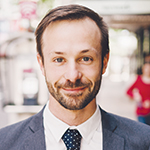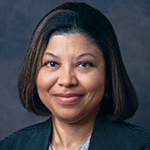
Should public health explicitly consider spirituality as a social determinant of health?
A group of researchers say yes, based on their review and analysis of thousands of articles and studies about the topic. One of those researchers said the findings and recommendations should be particularly relevant for Catholic health care providers.

The research was published in the July 12, 2022, issue of JAMA and analyzed in the June 2024 issue of Health Affairs. Katelyn Long, a co-author on both articles, and Xavier Symons, a co-author on the Health Affairs article, spoke about the research and analysis on Aug. 13 during a CHA-sponsored webinar called "Spiritual Care Dialogue — Spirituality as Determinant of Health: Implications for Catholic Health Care."

Long is a research associate with the Institute for Quantitative Social Science at Harvard University. Symons is the director of the Plunkett Centre for Ethics at Australian Catholic University.
Long explained why she and other researchers did what the JAMA article calls "a systematic review of the available evidence regarding spirituality in serious illness and health outcomes."
"There's growing research in spirituality, illness and health, but there is limited, or I would say sometimes resistant, uptake in some cases to integrating it into health systems or into public health policy," she explained. "Sometimes it's because the research wasn't getting into high-impact journals. Other times, there might be some bias at play with what editors wanted to put out into the world. There's just different reasons. And so we thought, we know there's a lot out there, what if we brought it all together?"
She added that there is "an ongoing recognition that health has a spiritual dimension, that people are more than just bodies, that there's minds and spirits at play as well, and we have to attend to the whole person in pursuit of true health."
Thousands of articles
The researchers reviewed over 15,000 articles published from 2000 to 2022 and included ones with a larger sample size and stronger research methods. Of the articles they chose, 371 addressed topics related to the role of spirituality in the lives of patients who were hospitalized with serious illness or at the end of life, and 215 articles addressed spirituality and health in the general population.
A panel of researchers reflected on the evidence presented in the article, and came up with several evidence-based statements. Long emphasized four:
- Recognize spirituality as a social factor in health.
- Use evidence-based approaches to spirituality and health.
- Provide spiritual care education for health professionals.
- Provide spiritual care and support within health systems.
The researchers looked at specific examples of where this was already being done, such as in a program in Memphis, Tennessee, that connects the Methodist Le Bonheur Healthcare system with 690 mostly Black churches, and a program at Atrium Health Wake Forest Baptist Medical Center in North Carolina that engages congregations in 26 counties to connect volunteers to patients.
Based on their analysis, Long and her co-authors' first recommendation is to support spiritual and religious literacy at the training stage for medical students and public health practitioners, even if that means starting with one lecture to introduce these ideas.
The second recommendation is to pursue relationships and common goals between those in the public health and faith communities, rebuilding trust that was strained or broken during the COVID-19 pandemic, and thinking of creative ways to serve communities well.
The third recommendation is to think about how to pay for spiritual care within the U.S. health system.
Symons added that the researchers kept in mind all faith traditions. "In a sense, we're even kind of transcending tradition-specific approaches or frameworks, where we're hopefully also tracking a little bit how spirituality, very broadly conceived, can be very helpful for people," he said. "It can be very helpful for guiding the way we provide health care."
He added: "It strikes me that this is all material that can be examined specifically within the Catholic context. I think we're well-positioned to do that within the Catholic sector, because ... there is so much going on already." Those in Catholic health care need to be a little bit more intentional about examining their work and review the evidence base as much as they can, he said.
The Good Samaritan's role
During the webinar, Ruth Jandeska, the system director for spiritual health and mission for Bon Secours Mercy Health, offered her perspectives on the research and how practitioners could take next steps. Jandeska said she was "excited and joyful to learn more about this work" and that it left her feeling "very optimistic as a health care leader and very validated as a chaplain."

She revisited the CHA vision statement: "We will empower bold change to elevate human flourishing." She said the statement "is really an invitation to all of us in Catholic health care to reimagine what health care can be, and specifically to those of us that carry out the expertise of clinical spiritual care, to begin to ask ourselves how we might join in this collective effort towards a future that serves the good of all, particularly those who are poor and vulnerable."
She recounted the biblical story of the Good Samaritan, in which a stranger comes to the aid of a man who had been attacked and stripped by robbers.
Jandeska said she is aware of similar stories in Catholic health care, such as the clinicians who noticed a woman in anguish and screened her for spiritual distress, a chaplain who helped a man who had burned his bridges and struggled with substance abuse disorder, and a clinical pastoral educator who worked with her department director to design a curriculum to address today's needs.
Recalling what Jesus said regarding the Good Samaritan, she urged: "Go and do likewise."
